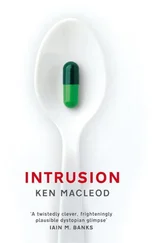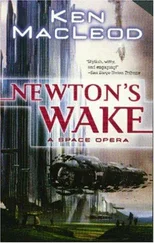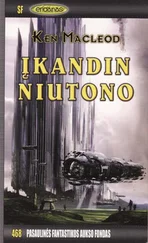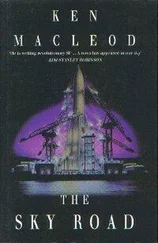Orro fussed for a moment.
“Oh, good lady above,” said Kwarive. She snatched up a screwdriver and had every component in place and the receiver back on its flex within minutes.
“Now then,” she said, holding it up, “the basket, if you please.”
Darvin hefted the basket and walked towards her. Kwarive smiled. “The buzz is back!” she said.
This time the tedious sorting procedure sifted out two of the electric snittles (as they’d started calling them). The three scientists peered down at the two unprepossessing insects. The two insects — Darvin couldn’t but fancy — looked back.
“Hello,” he said. “Greetings from Ground.”
Orro grabbed his shoulder so hard that it hurt. “We could do that!” he said.
“Do what?”
“Use the electric snittles to communicate with the visitors.”
Darvin burst out laughing.
“What’s so funny?” demanded Kwarive.
“Oh, nothing,” Darvin said. “It’s just that I had a sudden vision of a conclave of scientists and security men jabbering and capering in front of a glass case floored with shit and crawling with shittles.”
“Well, why not?” asked Orro.
Darvin sat down on a stool and looked from Orro to Kwarive and back. He scratched the fur on the back of his calf. “No reason why not,” he said. “It’s just that I sometimes find it hard to believe. You both evidently don’t.” He stood up and paced around, scouting for tea. “For one thing,” he said, “the signal these little — and I stress little — blighters put out couldn’t possibly reach… its supposed recipients.”
“You’re doing it again,” said Kwarive. “Saying what they can and can’t do without evidence. We’ve just seen evidence that they can do things we can’t. The pot and the brazier are behind that stuff on the ledge, by the way.”
“Oh, thanks.”
“No, he’s right,” said Orro. “It’s a question of output power. There are theoretical limits to how much electrical power can be extracted from chemical processes.”
“And you know these limits, I suppose?” asked Kwarive.
“I do, as a matter of fact,” said Orro. He brushed at his eyes as if weary. “I wrote the paper on it. Nevertheless, there is a way in which such weak signals could reach our, ah, supernumerary moon, if not farther.”
Darvin fiddled with gas taps and water taps. “And what’s that?”
“Amplification,” Orro said.
“You astonish me,” said Darvin, sparking up the flame under the brazier. “The question we’re all agog to hear the answer to is what such an amplifier might be.” He waved a hand at the window, at the view of buildings and trees. “Given that we don’t see telekinematographic transmission towers mysteriously springing up all over the place.”
“Oh!” said Kwarive. She hopped on a perch and spread her wings. “We do!”
Darvin, unable to wait for the tea, pushed some leaf under his tongue and grunted a query.
“Trees,” said Kwarive. “Look at the shape: the tall central spire and the upward-curving floret of branches. Does that not remind you of something, Orro?”
“I concede the resemblance,” said Orro. “Doubtless it inspired the design of the transmission and reception antennae.”
“You never told me this,” said Darvin.
“No, I never did,” said Orro. “I was, ah, discussing Gevorkian science with Kwarive one day and it slipped out. I have since then guarded my tongue more carefully. However, this is not the point. The point is that I don’t see how trees could be so used. Wood is not, after all, renowned for its electrical conductivity.”
Kwarive hunched like a hunter watching prey from a branch. She scratched behind her ear. Darvin, knowing the signs, said nothing more until the pot had boiled and he had served the tea in three containers that (Kwarive assured him) were used only for that purpose, and not to hold any of the unsavoury liquids and pulps that the room’s other identical beakers contained.
“So, Kwarive. You were saying.”
“I think I have it now,” she said. She blew and sipped. “If copper wire can be formed inside a shittle, why can’t it — or some other metal — be formed inside the branches and spire of a tree? Along the capillaries, perhaps?”
“Why do you say it was formed?” asked Darvin. “I had imagined it was somehow implanted.”
“If it was implanted,” said Kwarive, “our visitors are a great deal closer than we think.” She laughed. “They fly among us.”
“That’s a possibility,” said Orro. “I can imagine, say, a mechanical flitter. Like one of my chiropter models, only successful. With tiny manipulative hands, like a real flitter.”
“Oh yes,” said Darvin. “I can see it now, preying on the shittles among a flock of real flitters, and stashing some away to vivisect in its nest!”
“Why not?” said Orro. “We are agreed that calculating machines may make great progress in ages to come.”
Kwarive extended and quivered her wings, almost spilling the tea. “And does it mine the copper and whatever substance the coloured crystals are made from? Or does it perhaps steal them from shops?”
Orro was immune to her sarcasm. “Some species of flitters are notorious for stealing odds and ends of material for their nests.”
“Oh, for the Queen’s sake, gentlemen,” said Kwarive, “will you stop this idle speculation and listen to my — to my—”
“ Your idle speculation?” said Darvin.
Kwarive laughed. “Indeed. But listen. How I had imagined it was something quite different. Fix your attention on a congenial subject for a moment. Sex. The male, as you may know, produces a sticky fluid with which he impregnates the female.”
Darvin gaped at Orro. “So that’s what happens!”
“Shut up,” said Kwarive. “As you also know, the life-bearing seed is a microscopic animalcule. And yet somehow, from this tiny invisible seed comes, in due course, a litter of kits.”
“The seed has to combine with the female egg,” said Darvin, entering into the spirit of conveying no news.
“Which is larger but still microscopic,” said Kwarive. “And somehow, from one or both of these, come a clutch of living things, each large enough to hold in your hand. Which, as they grow up, display characteristics similar to those of their parents.”
“Fascinating,” said Darvin. “The mystery of life. The miracle of reproduction. I don’t know why I didn’t learn all this in school.”
“I did not,” said Orro. “I read it in an imaginative but broadly accurate illustrated treatise inscribed, if memory serves, on the wall of a municipal pissery.”
“Each to his own,” said Kwarive. “My point, if I can momentarily distract you, is that reproduction is not a miracle. The life principle in the germ-plasm somehow organises and controls a mass of matter that but yesterday was the mother’s food, and transforms it into another living organism. Forces that we do not understand shape every organ and limb, and in a manner which is inherited from the parents. The vehicles of that inheritance are without doubt the tiny egg and the still smaller seed.”
“I see,” said Orro. “You are suggesting that the seeds or eggs of the shittles have somehow been influenced to produce small electrical devices, as if they were bodily organs. And that a similar influence may be exerted on the growing-power of certain trees, albeit ones already mature, perhaps due to the greater plasticity of the botanical cell-plasm.”
“Yes!” said Kwarive, sounding surprised and relieved. “That’s exactly it.”
“But — copper wires !” said Darvin.
’That’s the easiest part of it,” said Kwarive. “There are copper salts everywhere. Other mineral salts form naturally on dung. We all have a tincture of iron in our blood.”
Читать дальше












